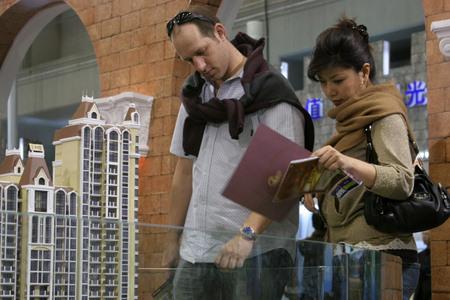
Overseas vistors at a real estate exhibition in Beijing. According to foreign real estate funds, there will be good buying opportunities in the coming six to 12 months. [Photo: China Daily]
The coming six to 12 months will present good investment opportunities in China's property sector as liquidity in the market is expected to largely tighten during that period, according to leading foreign real estate funds.
"We believe it will be the right buying time in China's residential sector in the following six to 12 months," said Nicholas Loup, chief executive of Grosvenor Asia Pacific.
The UK-based Grosvenor, which manages $16 billion in assets, aims to raise at least $270 million for a fund that will invest in Chinese properties as part of its expansion in Asia.
Raymond Lee, CEO of Savills Greater China, held a similar viewpoint.
"A good opportunity will emerge for long-term investors in the coming six to 12 months, and what foreign real estate funds are doing now is finding a legal fund vehicle that can get their money into the country," said Lee, adding that a large amount of foreign capital is expected to flow into China this year.
The Ministry of Commerce said on Tuesday that China's utilized foreign investment climbed 27 percent year-on-year to $17.8 billion in the first two months of this year, of which $4.15 billion was used in the real estate sector, up 50.5 percent year-on-year.
To curb the trend, the ministry ordered local authorities to halt the approval of some foreign property investments to stop speculative purchases, it said in a Nov 22 statement. Local authorities are also required to strengthen their reviews of foreign exchange inflows for real estate transactions and documentation for land rights.
Currently, there are two major channels for foreign capital to flow into the Chinese mainland's property market: taking part in the development stage with local partners and cooperating with Hong Kong-listed real estate companies.
"Given the continuous tightening of bank lending and falling property sales, the cash flow for the small and medium-sized real estate firms will be further squeezed in the second half of this year, thus providing more equity investment opportunities for foreign institutional investors," said Chris Brooke, president of CB Richard Ellis China.
"The pricing for residential projects will be more competitive, but those investors also keep a close eye on the commercial and logistics sectors, betting on China's domestic consumption in the long run," Brooke added.
According to Richard van den Berg, managing director of ING Real Estate Investment Management Asia Ltd, the government's tightening of real estate policies mainly targets medium and high-end residential properties that saw excess short-term price growth. "If foreign investors can avoid these sectors, their investment will not be affected," said Van den Berg.
ING is going to raise a second China real estate fund on a scale of about $500 million, he told China Daily.
"But compared with our first China real estate fund, we may increase our investment into the commercial sector," Van den Berg said.
Though some foreign investors are concerned about China's potential policy risks, Loup said the country offers a clear long-term picture through the 12th Five-Year Plan (2011-2015).
Related News
Photos
More>>trade
- Li Anze met Xie Baojun,Chairman of the board of Henan Hengxing Science Co., Ltd
- New march to the Taiwan stock market
- Mr. President Invites You to Attend the Lecture ---Professor Zhou Xiaozheng
- The President of CNU Invites You to Attend a Lecture: Zhou Xiaozheng Comments on
- Celebrating IPO of MCC Limited in Beijing





